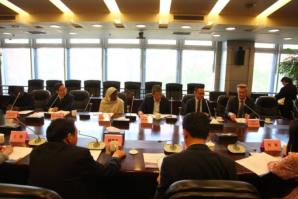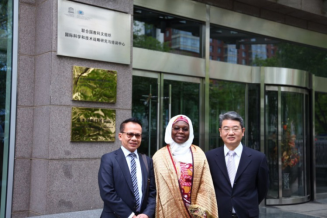From April 24 to 28, 2017, the International Research and Training Center for Science and Technology Strategy (CISTRAT), a UNESCO category-2 center supported by the Chinese Academy of Science and Technology for Development (CASTED), went through a week-long comprehensive review. Commissioned by UNESCO, Jummai Umar-Aijila, CEO of The Business People, a consulting firm in Nigeria, and his assistants formed an expert evaluation team, with the accompany of UNESCO program officer Yoslan Nur. The evaluation was conducted through field visits, employee interviews, questionnaires, internal reports, external evaluations, multi-stakeholder discussions, and concluding discussions. The expert team highly recognized the research and training work conducted by CISTRAT in the past six years.
On April 25, the experts visited the CISTRAT secretariat and reviewed the CISTRAT profile, annual reports, previous council minutes, financial reports, self-assessment reports, mid-term development plans, and annual publications. They appreciated the solid research work of CISTRAT. They also talked with CISTRAT employees and distributed questionnaires to CISTRAT employees and managers. Subsequently, CISTRAT held the UNESCO evaluation report meeting, which was chaired by CASTED Vice President Wu Yishan. Hu Zhijian, Director of CISTRAT and President of CASTED, presented a “Self-evaluation Report for 2012-2017”. CISTRAT researchers Zhao Yandong, Li Zhe and Xuan Zhaohui reported the center’s performance of international research and training cooperation in the areas of “responsible research,” “inclusive innovation,” and “science and technology indicator statistics”.

On April 26, CISTRAT held an exchange meeting between the UNESCO expert evaluation team and the partner institutions. The meeting invited representatives of the CAS Institutes of Science and Development, the Development Center of the Science and Technology Park of Tsinghua University, the International Center on Space Technologies for Natural and Cultural Heritage and the China Knowledge Center for Engineering Sciences and Technology. The delegates highly appreciated the work carried out by the CISTRAT in the past six years since its establishment, and commended CISTRAT for actively conducting research and boosting the influence of research results. With the expanded scope of trainees in terms of countries and fields, the results of training have been most significant. CISTRAT has provided a great deal of assistance for other category-2 centers, and gradually developed a model of conducting joint research with developed countries and sharing research results with developing countries.

On April 28, the CISTRAT held a UNESCO evaluation summary meeting. At the meeting, the UNESCO program officials and evaluation experts, based on a week-long review consisting of field survey and expanded investigation, highly recognized the role of CISTRAT as a bridge between the Chinese government and UNESCO headquarters, and concluded that the work of CISTRAT is consistent with the requirements of the signed agreement, the activities carried out with partner institutions are extensive and effective, the management quality of the team is well guaranteed and the financial conditions are sound. With the overall consideration of indicators such as research, training, cooperation and influence, the expert team strongly recommended that the UNESCO headquarters renew its cooperation agreement with the Chinese government.

UNESCO program officials and evaluation experts applauded the positive role of the five training sessions in shaping the science, technology and innovation policies and strategies of developing countries. At the same time, they also offered constructive suggestions on the work of CISTRAT in the next stage, including selection of trainees, seeking more government input, expanding the scope of CISTRAT’s own research areas and experience sharing, improving the quality of training, building closer links with UNESCO and related partner institutions, establishing a network of graduates and boosting CISTRAT’s influence and visibility. In the future, CISTRAT will focus on the UN development goals and actively carry out the relevant work in accordance with the above requirements.

 No.8 Yuyuantan South Road, Haidian District, Beijing, 100038
No.8 Yuyuantan South Road, Haidian District, Beijing, 100038
 +8610 58884695 58884506
+8610 58884695 58884506
 +8610 58884678 58884588
+8610 58884678 58884588
 casted@casted.org.cn
casted@casted.org.cn
 http://www.casted.org.cn
http://www.casted.org.cn
